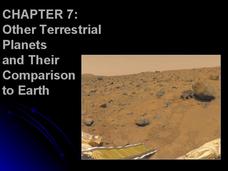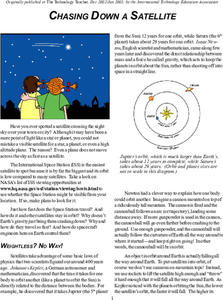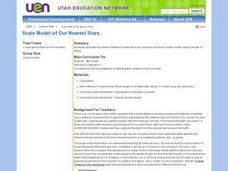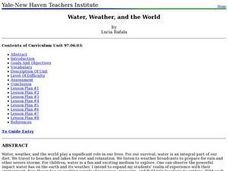NASA
The Saturn System Through the Eyes of Cassini
Get a close-up view of Saturn. Pupils read a NASA eBook filled with images of the Saturn system, including the rings and moons of Saturn along with images of the planet itself. Learners become familiar with the planet's system as they...
Keep it Simple Science
The Earth in Space
Skim the surface of the earth with this brief, compact, summary of outer space. The sun, stars, galaxies, planets, and phases of the moon can be found in this all-in-one resource. Seventh graders will enjoy these simple worksheets to do...
Star Date
Build Your Own Galaxy
Don't just look at pictures of the Milky Way galaxy, build it with this hands-on activity in which scientists recreate the galaxy we live in.
NASA
Let's Investigate Mars
Take your science class on a hypothetical field trip to Mars with an engaging astronomy instructional activity. After first learning about NASA's Mars rover missions, young scientists plan their own scientific investigations of Earth's...
Curated OER
Characteristics of the Outer Planets
A brief reading comprehension exercise, this worksheet covers the characteristics of the outer planets. It still considers Pluto a planet and Charon its moon. It is therefore a little out of date, but this fact can be discussed as part...
Lunar and Planetary Institute
Oreo Moon Phases
Learning about the moon has never tasted delicious! Using the popular Oreo cookie as a model, young scientists carve out the cream filling to represent the different phases of the moon.
Laboratory for Atmospheric and Space Physics
Looking to the Future
New Horizons set forth on a mission to Pluto in 2006. Ten years later, the spacecraft is still on its way. Here, enthusiastic scholars predict what they will be like—likes, dislikes, hobbies, etc.—when New Horizons arrives at its...
Laboratory for Atmospheric and Space Physics
Growing Up With A Mission
New Horizons began its journey to Pluto in 2006. Ten years later, it continues its mission. In that time, scholars have surely grown, but how much more will they grow by the time New Horizons reaches its destination? Find out with an...
Glynn County School System
Milky Way Galaxy
There is more about the Milky Way that scientists don't know than what they do know—that leaves a lot to discover! A thorough lesson presentation explores the components of the Milky Way Galaxy and their behaviors.
Glynn County School System
Terrestrial Planets
Mercury, Venus, Earth, and Mars are collectively known as the terrestrial planets. Although part of the same group, each planet has its own set of characteristics. Scholars explore the characteristics that make the planets unique and...
Glynn County School System
The Moon
People may not be able to jump over the moon, but scientists can still study it! The moon is covered with mons (mountains) and mars (seas). Aspiring astrologists learn about the moon's features and phases in a PowerPoint presentation. In...
Utah Education Network (UEN)
Utah Open Textbook: Earth and Space Science
From the vast universe to natural disasters, Earth and Space Science studies phenomena near and far. A complete textbook offers informational resources for a high school Earth and Space Science course. Chapters include topics such as the...
CK-12 Foundation
CK-12 Earth Science Concepts for Middle School
Explore a variety of science concepts in an interactive textbook created for middle school scholars. A lengthy table of contents takes readers to pages comprised of a subject overview, outline, and summary. Follow links further to find...
American Museum of Natural History
What Do You Know About Stars?
Illuminate the information about stars. Pupils respond to 10 multiple choice questions about stars. The questions cover topics such as the size of the Milky Way Galaxy, the Sun, and the life cycle of a star. The resource works as a...
NASA
Chasing Down a Satellite
Calculate the speed of the International Space Station. By reading the article, pupils learn about the concept of orbits. Scholars work through a formula to determine how fast the International Space Station is traveling to stay in...
Curated OER
Planetary Profiles
Students explore the characteristics of the planets and moons in the solar system. They create profiles of the nine planets in the solar system and present a written and oral report about a planet.
Curated OER
Scale Model of Our Nearest Stars
Sixth graders calculate a light day, light hour, and light minute from the standard of a light year. After establishing the distances, a one meter scale is created to demonstrate the distance between the sun and the planets of our solar...
Curated OER
Cosmic Wheels
Young scholars build a scale model of the Solar System and determine the time other planets take to travel around the Sun in comparison to the time of the Earth's revolution. The velocity of the planets are also determined in this lesson.
Curated OER
Comet Encounters
Students create glitter-covered comet models. Then they make large outdoor chalk drawings of the solar system and place their comets at the location of the Kuiper belt. They carry their comets around an orbit of the sun, shaking various...
Curated OER
Water, Weather, and the World
Students in a special education classroom examine the role of weather and water in their lives. Each day, they add a symbol for the weather outside and identify the proper activities for the weather on that day. In groups, they...
Curated OER
Moons, Gods and Goddesses
For this moons, gods and goddesses worksheet, students complete a crossword puzzle given 23 clues about gods and goddesses in Greek myths and moons. Students are given a list of the moons in our solar system.
Curated OER
The Sun Affects Earth
Third graders read, write, and listen to information about the sun and its effects on the Earth.as it relates to its axis, orbit, rotate, and revolution. In this solar system lesson, 3rd graders examine how the sun effects the Earth's...
Curated OER
Living On The Moon
Students evaluate what life would be like living on the moon or another planet in our solar system. In this science lesson, students create a colony that they would use to live in on the moon using Legos.
Curated OER
When a Ruler is Too Short
Young scholars measure distances using parallax. In this math lesson, students explain how this method helped astronomers with their studies of the solar system. They determine the length of their arm using parallax and compare it with...
Other popular searches
- Solar System Crossword
- Solar System Worksheets
- Solar System Word Search
- Solar System Art
- The Solar System
- Solar System Lesson Plans
- Solar System Math
- School Projects Solar System
- Components of the Solar System
- Solar System Model
- Earth Movement Solar System
- Solar System Constellations

























